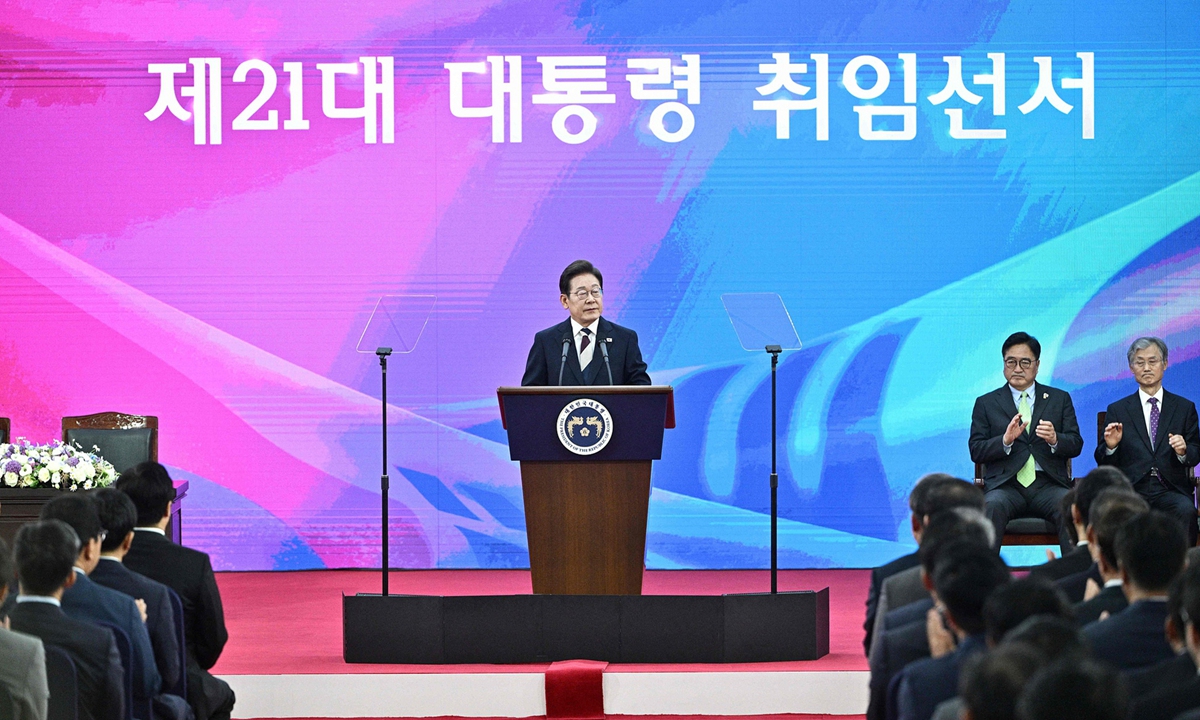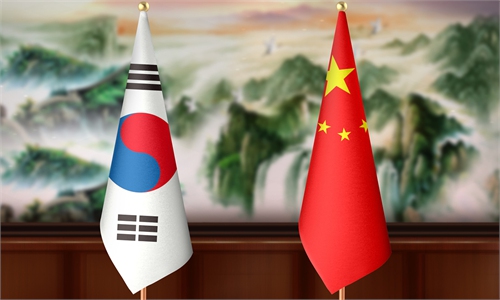Hoping for a new starting point in development of China-South Korea relations: Global Times editorial

South Korea's President Lee Jae-myung (left) delivers a speech after taking his oath during his inauguration ceremony at the National Assembly in Seoul on June 4, 2025. Photo: VCG
On Wednesday, Lee Jae-myung of the Democratic Party of Korea was elected South Korea's 21st president and subsequently sworn into office. On the same day, Chinese President Xi Jinping extended congratulations to Lee, expressing that China attaches great importance to the development of China-South Korea relations. President Xi stated that China stands ready to work with South Korea to stay committed to the spirit that guided the establishment of their diplomatic ties, uphold good-neighborliness and friendship, and stick to the goal of mutual benefit and win-win results so as to jointly promote the continuous development of the China-South Korea strategic cooperative partnership, and bring more benefits to the two peoples. This message not only reflects China's sincere expectations for the bilateral relationship, but also conveys high hopes for the future of China-South Korea ties amid a complex international landscape.
This presidential election in South Korea was held following the impeachment of former president Yoon Suk-yeol. The South Korean public widely hoped that the election would help the country emerge from its current state of turmoil and bring national governance back on track. Just hours after declaring victory, Lee was formally sworn into office - an act that, while procedural, also reflected a sense of urgency. In his inaugural address, Lee pledged to begin his administration by restoring people's livelihoods and reviving the economy. On foreign affairs, he emphasized a pragmatic diplomacy guided by national interests and a practical approach to relations with neighboring countries. The Korea Herald noted previously that Lee's diplomatic pragmatism signaled "a reset of the strategic compass for the country's foreign and North Korea policy," suggesting that he rejected being "boxed into binary choices." We look forward to President Lee's national interest-oriented foreign policy bringing positive momentum to China-South Korea relations.
Recalibrating the Yoon administration's one-sided diplomacy and returning to South Korea's traditional policy of balanced diplomacy - especially by managing relations with neighboring countries, including China - is an essential component of the Lee government's "pragmatic diplomacy." During his presidency, Yoon pushed the idea of taking sides to the extreme under the banner of "values-based diplomacy," which not only failed to make South Korea a "global pivotal state," but also dragged the country into even greater uncertainty.
Tensions between North and South Korea continue to escalate, while the perceived "dividends" of the US-South Korea alliance are being offset by the high cost of stationing US troops and ongoing trade frictions. These factors have weighed heavily on South Korea's economy, and public uncertainty about the country's future has been spreading. Against this backdrop, China-South Korea relations have also experienced their lowest point since diplomatic ties were established. Wrong remarks and actions by the former Yoon administration regarding the Taiwan question further damaged bilateral ties, resulting in setbacks to cooperation.
China and South Korea are close neighbors that will always live with each other, and inseparable partners who should maintain frequent exchanges and grow closer through mutual engagement. Over the 33 years since the establishment of diplomatic relations, the rapid development of China-South Korea relations can be fundamentally attributed to the two sides transcending differences in ideology and social systems, moving forward hand in hand and achieving mutual success.
President Lee previously stated that "pragmatic diplomacy" must go beyond ideology, emphasizing that South Korea cannot afford to abandon ties with China because "our economies are deeply intertwined with them and geography makes separation impossible. It's fate - our destiny." We appreciate President Lee's profound understanding and also hope to see more concrete steps taken toward mutual engagement.
China has long maintained its position as South Korea's largest trading partner, while also serving as a major destination for South Korean investment and consistently ranking among the top three overseas markets favored by South Korean enterprises. There is vast potential for the two countries to foster a healthy and robust economic relationship and strengthen cooperation in trade and investment with third parties. In recent years, competition between the Chinese and South Korean industries has increased, but the strategic and mutually beneficial nature of their cooperation has not changed. China's vast market, complete industrial system, and continuously expanding opening-up policies remain significant opportunities for the South Korean economy. Furthermore, China and South Korea can work together to play a greater role in regional affairs, including promoting free trade and maintaining peace and stability on the Korean Peninsula while jointly addressing various uncertainties. Maintaining strategic communication and expanding the scope of friendly cooperation between China and South Korea can not only promote trade and personnel exchanges in East Asia and inject momentum into each other's economies, but also serve as a positive signal welcomed by the region and the world.
The fundamental driving force behind the development of China-South Korea relations lies in their shared interests, which are not aimed at third parties and should not be influenced by third-party factors. China has always adhered to the principle of non-interference in internal affairs and has never interfered in South Korea's development of relations with other countries. China also hopes that South Korea will eliminate third-party interference and uphold an independent foreign policy, particularly by not sacrificing its relationship with China to pave the way for developing relations with other countries. History has repeatedly proven that such actions are detrimental to South Korea and contrary to the general expectations of regional countries.
China's sincerity and goodwill toward the development of China-South Korea relations remain unchanged, even in the face of difficulties in the bilateral relationship. Hopefully the new South Korean government will seize opportunities with strategic foresight, and promote the stable and long-term development of the China-South Korea strategic cooperative partnership through practical actions. This not only aligns with the fundamental well-being of the people of both countries but also will inject stability into the peace and development of Northeast Asia and the world.

